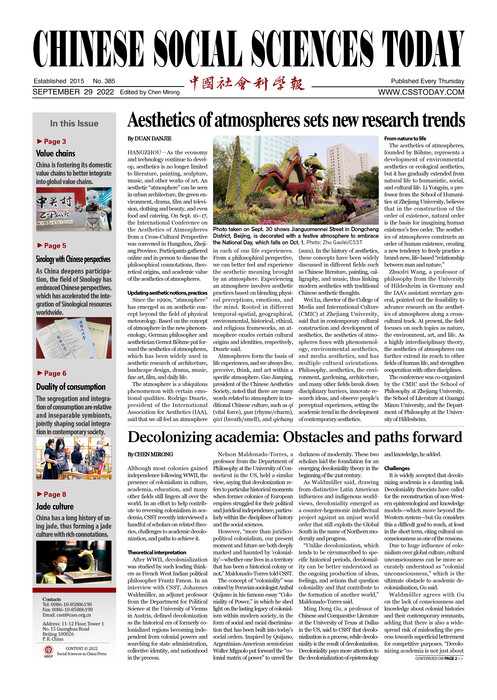Decolonizing academia: Obstacles and paths forward
2022-09-29 16:25:47
By CHEN MIRONG
Although most colonies gained independence following WWII, the presence of colonialism in culture, academia, education, and many other fields still lingers all over the world. In an effort to help contribute to reversing colonialism in academia, CSST recently interviewed a handful of scholars on related theories, challenges to academic decolonization, and paths to achieve it.
Theoretical interpretation
After WWII, decolonialization was studied by such leading thinkers as French West Indian political philosopher Frantz Fanon. In an interview with CSST, Johannes Waldmüller, an adjunct professor from the Department for Political Science at the University of Vienna in Austria, defined decolonization as the historical era of formerly colonialized regions becoming independent from colonial powers and searching for state administration, collective identity, and nationhood in the process.
Nelson Maldonado-Torres, a professor from the Department of Philosophy at the University of Connecticut in the US, held a similar view, saying that decolonization refers to particular historical moments when former colonies of European empires struggled for their political and juridical independence, particularly within the disciplines of history and the social sciences.
However, “more than juridico-political colonialism, our present moment and future are both deeply marked and haunted by ‘coloniality’—whether one lives in a territory that has been a historical colony or not,” Maldonado-Torres told CSST.
The concept of “coloniality” was coined by Peruvian sociologist Aníbal Quijano in his famous essay “Coloniality of Power,” in which he shed light on the lasting legacy of colonialism within modern society, in the form of social and racial discrimination that has been built into today’s social orders. Inspired by Quijano, Argentinian-American semiotician Walter Mignolo put forward the “colonial matrix of power” to unveil the darkness of modernity. These two scholars laid the foundation for an emerging decoloniality theory in the beginning of the 21st century.
As Waldmüller said, drawing from distinctive Latin American influences and indigenous worldviews, decoloniality emerged as a counter-hegemonic intellectual project against an unjust world order that still exploits the Global South in the name of Northern modernity and progress.
“Unlike decolonization, which tends to be circumscribed to specific historical periods, decoloniality can be better understood as the ongoing production of ideas, feelings, and actions that question coloniality and that contribute to the formation of another world,” Maldonado-Torres said.
Ming Dong Gu, a professor of Chinese and Comparative Literature at the University of Texas at Dallas in the US, said to CSST that decolonialization is a process, while decoloniality is the result of decolonization. Decoloniality pays more attention to the decolonialization of epistemology and knowledge, he added.
Challenges
It is widely accepted that decolonizing academia is a daunting task. Decoloniality theorists have called for the reconstruction of non-Western epistemological and knowledge models—which move beyond the Western system—but Gu considers this a difficult goal to reach, at least in the short term, citing cultural unconsciousness as one of the reasons.
Due to huge influence of colonialism over global culture, cultural unconsciousness can be more accurately understood as “colonial unconsciousness,” which is the ultimate obstacle to academic decolonialization, Gu said.
Waldmüller agrees with Gu on the lack of consciousness and knowledge about colonial histories and their contemporary remnants, adding that there is also a widespread risk of misleading the process towards superficial betterment for competitive purposes. “Decolonizing academia is not just about
being more diverse or participatory on an allegedly equal global level playing field,” Waldmüller said. Decolonization is fundamentally about effectively remedying historical injustices, and a fully-fledged transition on global levels with regard to still prevalent forms of colonial-like conditions in knowledge development and dissemination.
The obstacles to achieving academic decolonization are multifold, Maldonado-Torres said. “They include the logics of ‘diversity and inclusion’ that leave the coloniality of disciplines and fields of study untouched and have become tools to manage potential challenges to discourses of white innocence.”
Maldonado-Torres further identified the idea that advancement in the Global South is understood in terms of modernization and development as another challenge. Modernization and development presuppose that the “modern West” is an ideal which the Global South must strive towards. “In the academy, the presuppositions of modernization and Euro-centered development are particularly grave, since academic recognition and success tends to be determined by recognition by, or imitation of, the academy in the Global North,” he said.
Suggestions
To decolonize academia, Waldmüller suggested, at a macro level, instituting globally administered research, network, and publication funds, and fostering open access to library resources and translational efforts, especially for the Global South. Research, particularly in times of climate change and planet-threatening risks, should become disentangled from national logics of regional and global competition, he said.
At the meso level, key science programs, not only technology, business, and legal, but also historical studies, need to be revisited, inter-culturally sensitized, and cleaned out from content that reproduces claims to superiority on any misinterpreted basis of social constructivism, Waldmüller advised. At the micro level, academia should reinterpret the questionable concept of ex-cathedra teaching and learning, and of performance evaluations for both students and teachers alike, based on questionable hierarchies.
Maldonado-Torres said that decolonizing the academy requires acquiring critical distance from mainstream models of knowledge and education in the West, and bridging the gap with decolonial knowledge producers inside and outside the academy everywhere. “Decolonizing knowledge is a collective project across multiple borders: institutional, linguistic, national, etc.,” he said, urging efforts to build epistemic coalitions and engage in “combative decoloniality.”



